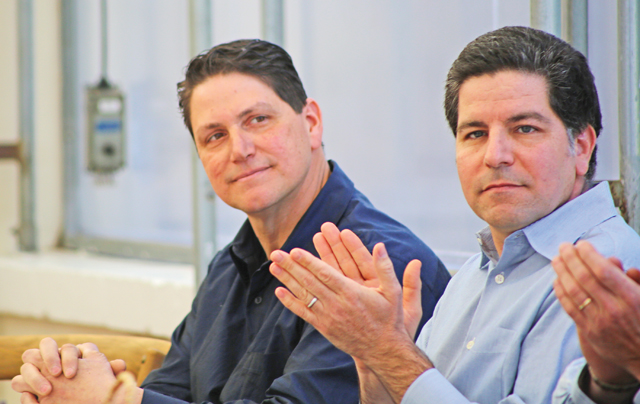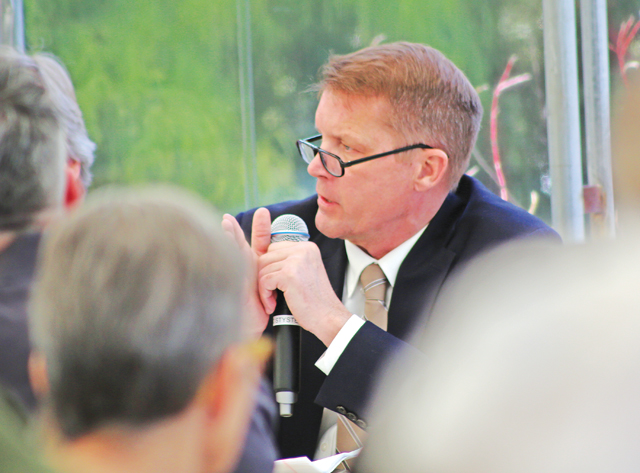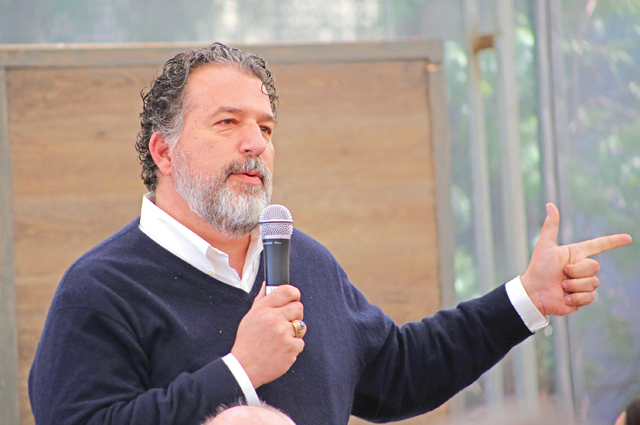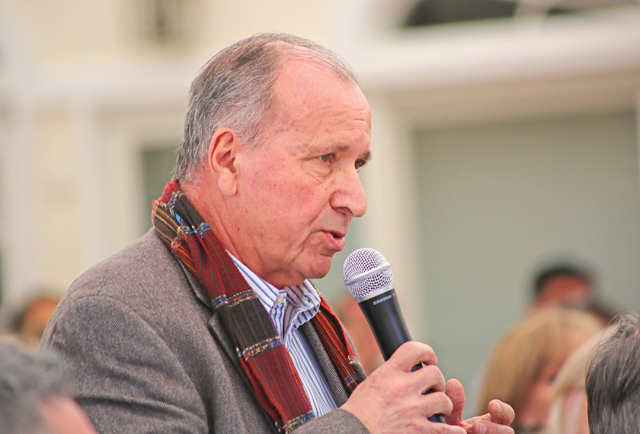Times Review Talks: The future of wineries on the North Fork

Brought to you by:
|
Asked to characterize his administration’s views on winery operations, Southold Town Supervisor Scott Russell said he doesn’t believe the town is “anti-winery,” saying instead he doesn’t wish to treat the craft beverage industry differently than any other operating there. |
His remarks came at last week’s Times Review Media Group event, “The Future of Wineries on the North Fork,” the second in a series of 10 panel discussions on newsworthy topics affecting Southold and Riverhead towns.
LISTEN TO THE EVENT BY PRESSING PLAY ABOVE
This month’s panel included Mr. Russell and Riverhead Supervisor Laura Jens-Smith, along with Long Island Wine Council president Anthony Sannino of Sannino Vineyard, Ron Goerler Jr. of Jamesport Vineyards, Ami Opisso of Lieb Cellars and Bridge Lane Wines, Rich Olsen-Harbich of Bedell Cellars and Kareem Massoud of Paumanok and Palmer Vineyards.
Mr. Sannino said that in order to discuss the future of our wine region, one must first reflect on its past.
“The wine industry started over 40 years ago and I’m not going to do a history lesson, but at the time, when we look at what agriculture was 40 years ago, from what I understand, the farmers were struggling with getting their product to market and selling it,” Mr. Sannino said. “Then, suddenly, grape growers appeared and the farmer had an option. So the farmer was actually fortunate enough to sell to another farmer, and then begin another industry, which became our industry.”
While the vast majority of farms in the western part of Suffolk County became houses, on the North Fork “we’re still planting grapevines,” he said.
“I think history is important,” added Mr. Olsen-Harbich, who has more than 30 years’ experience in the industry. “I think we have to remember that back in 1973, when this industry started, we were just in the early stages of having a wine culture in this country.”

Mr. Olsen-Harbich said it took decades to elevate North Fork wines to where they are today.
“To me, the future looks very bright,” he said, adding that local wines have improved in quality every year. “I don’t think I’m going to be here to see the best wines we will ever make.”
As for how wineries might operate in the future, many questions and answers centered on Mr. Russell, who said he objects to Southold being labeled as anti-winery. He also objected when event moderator Grant Parpan, digital and lifestyle content director for Times Review Media Group, stated that the supervisor had proposed several restrictions on wineries.
“The reality is, the code that covers wineries is one of the most permissive codes in the town code,” Mr. Russell said. “Including all industries, even other components of agriculture.”
He said the town has proposed only one code change dealing with wineries in the 14 years he’s been supervisor.
That proposal, in 2017, would have required someone looking to build a winery to grow grapes on at least 10 acres. The current code requires 10 acres of agriculture, but it doesn’t specify grapes, Mr. Russell said.
“I don’t think that’s an unreasonable restriction,” he said.
That proposal also required that 80 percent of the grapes used in the wine sold at wineries be grown locally.
Mr. Russell said there was opposition to that change. He said he feels if there had been better communication with the wine industry, the differences could have been resolved earlier.

Mr. Russell said other proposals out of Town Hall affected more than just wineries. One such change relates to how special events are approved.
“We were getting these very large events proposed, and what we decided to do was say, ‘Look, we need to have something in the code to start governing the special events,’ ” Mr. Russell explained. “We had this huge hue and cry at the Town Board meeting that the legislation is going to kill the industry.”
But the proposal didn’t kill the wine industry, Mr. Russell said. It expanded who could hold special events to all agricultural operations and businesses, in addition to wineries.
The town made other changes to the special events code, including taking authority from the Zoning Board of Appeals and giving it solely to the ZBA chair, and then later taking it from the ZBA chair and giving it the Town Board.
Mr. Russell said no one, including the local media, ever followed up to see if the code changes are working — and he feels they are.
“The review process for special events is faster and the approvals are quicker than ever before,” Mr. Russell said.
Another issue Mr. Russell brought up was food trucks at wineries. He said the town never changed its code to address food trucks, but the wineries changed their business models to bring food trucks onto their property.
“It sort of stepped outside the bounds of the code,” Mr. Russell said.
He said the town had no choice but to say it wasn’t permitted.
“Ultimately, I’m going to say there is a particular animus towards me as being the leader of the anti-winery movement,” Mr. Russell said. “And I’m going to be completely candid. I think it’s because I don’t show wineries the deference that might be expected from some. I look at wineries as no more or no less important than any other industry in Southold Town. They are no more important than the guy that sells fences, the bricklayer, the marinas. And they’re no less important.”
The supervisor said government shouldn’t be in the business of “picking winners and losers.”

One audience member questioned that mindset, saying wineries bring visitors to the region and therefore need to be viewed in a different light from other businesses.
Riverhead Supervisor Laura Jens-Smith said her town is known for its agriculture. She said the wine industry is growing and changing.
“You used to go to a winery and taste the wine and there was no charge,” she said. People could bring their own food.
Now, most wineries charge a fee for their tasting rooms and sell food to accompany the wine, she said.
“I think as a government official, we need to be conscious of the changes that are happening, and we need to have a synergy with local government and with the wineries as the industry evolves,” she said.
Mr. Parpan asked Mr. Goerler to speak about the importance of food at wineries.
“We did apply for a bistro license a couple years ago,” Mr. Goerler said. “Food is a natural thing that complements the wine. We’re very thankful that Riverhead Town approved us to do that bistro. It is something we believe is the future out here.”
Ms. Opisso said she grew up locally and graduated from Mattituck High School, but left the area after college because she didn’t think there was a job or industry for her here.
“So I went away for eight years and I established a career in advertising and marketing,” she said. “But I was eventually able to return home when I discovered that there was actually a thriving wine industry here.
“I never thought I would be back,” she added, “but wineries gave me the opportunity.”

Sal Diliberto, who owns Diliberto Winery in Jamesport, spoke about the importance of the transfer of development program in preserving agriculture on the North Fork. He said wineries bring people to the area on a year-round basis, unlike, for example, pumpkins or apple-picking.
Mr. Massoud and Mr. Goerler both said they have sold the development rights to their farms, a move that preserves the land permanently for agricultural uses only. Mr. Olsen-Harbich believes development rights have been sold on more than half of the land used as vineyards on the East End.
Mr. Russell said Southold Town is considering placing a $5 million referendum for preserving additional farmland on this November’s ballot.
“If we generally agree that the wine industry is a big part of our [overall] industry on the North Fork, and that growth and prosperity are things that we as a community want to see going forward, I think the wine industry has the writing on the wall that it will continue to be a big part of that,” Mr. Massoud said. “We are excited about the future.”








